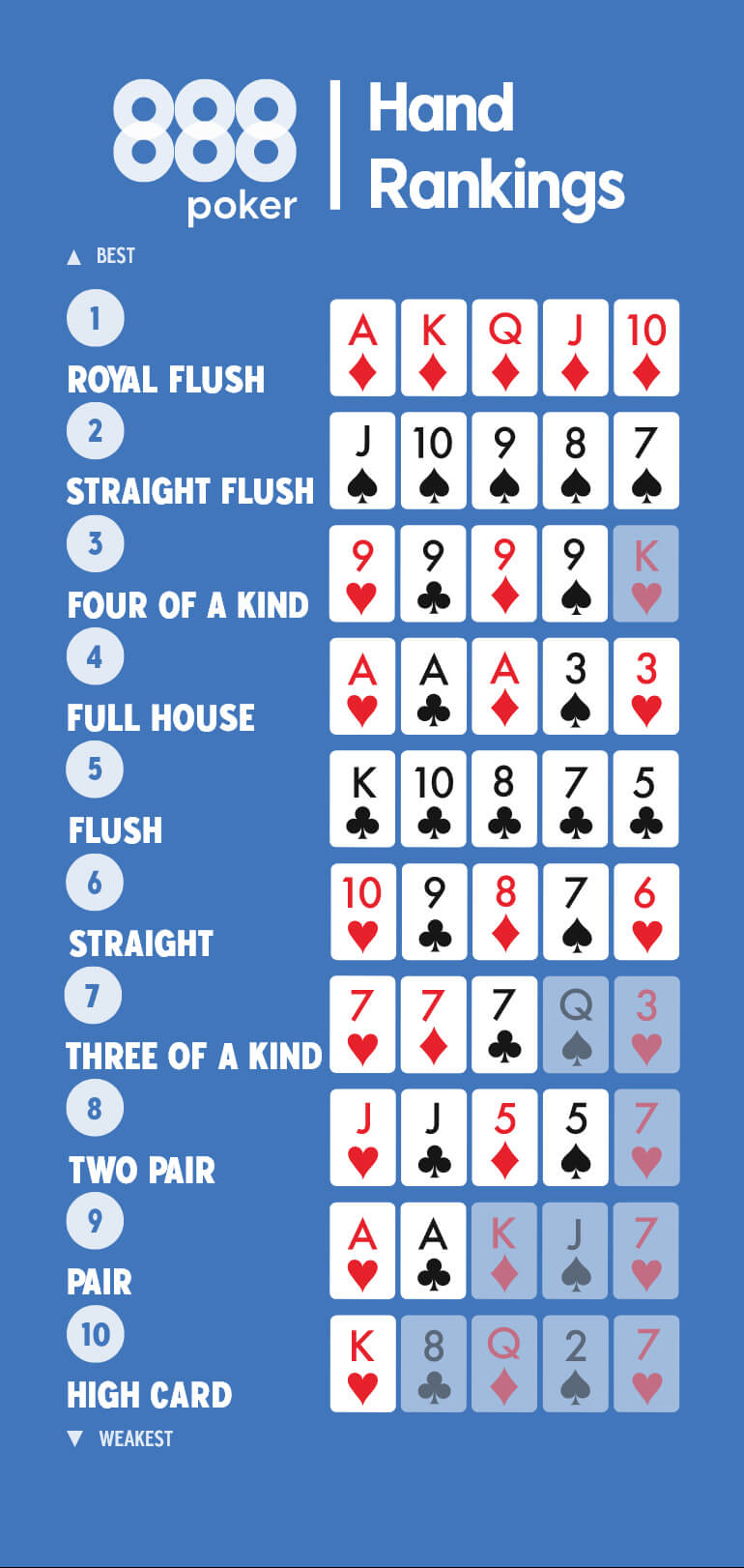Poker has numerous variants built upon the basic game. While we will explore these various types later, they all share key similarities.
The primary goal in poker is to leverage the cards in your hand to form the strongest five-card combination possible—or to persuade your opponents that you have the superior hand, even if that's not the case!
Poker Hand rankings guide
The cards in a poker deck are ranked in a specific order, from highest to lowest:
A, K, Q, J, 10, 9, 8, 7, 6, 5, 4, 3, and 2.
In striving to assemble your optimal five-card hand, typically you will aim for a:
...listed from strongest to weakest. Generally, the higher the rank of the cards in your hand, the more powerful it is. For instance, a pair of Aces trumps a pair of Queens, and a straight from 7 to Jack defeats one from 5 to 9.
Consult our comprehensive guide on poker hand rankings to learn how to maximize the potential of the hand you are dealt.
Even though you generally occupy the same spot at a poker table, your role concerning the order of play shifts with each hand based on the dealer.
In cases where there's a dedicated dealer, a Button indicates your position for each round, with gameplay proceeding clockwise around the table.
Your position at the table influences your betting strategy for several reasons. You may need to place a bet (known as a '' bet) before you’ve even looked at your cards. blind As the first player to act, you have less insight into how strong your opponents’ hands might be, which could lead to you being raised. Conversely, if you're the last to act, you’ll have more intelligence to make an informed decision—and you might even ‘steal’ the blinds with a strategic raise if others have folded.
As you refine your poker abilities, you'll realize that position plays a crucial role in determining the frequency with which certain hands or players prevail.
Be sure to save our guide to understand precisely where you stand (or sit, in this case!).
Here’s a concise 8-step overview for grasping the flow of Texas Hold'em—widely regarded as the most favored variation of poker. Ultimately, how the action unfolds is dependent on you and your opponents!
Poker rules – step-by-step
The dealer shuffles the playing cards before distributing them to each of the players at the table.
- Once the cards are dealt, the round of
- begins. At this stage, you can choose to fold, call, raise, or even re-raise, based on the strength of your hand. pre-flop The flop reveals the first three community cards. This moment marks your initial opportunity to contemplate building your complete hand; if your starting hand appears weak, it may be wise to fold at this juncture.
- The turn introduces the fourth community card. This is your next chance to evaluate your hand further. You can again check, call, fold, or raise; with more insight into the direction of play, you can plan your strategy for building your hand.
- The turn comes with the ‘turn’ of the 4thThe river unveils the fifth and last community card. Now equipped with full knowledge of your (Texas) hand, you can place more confident bets based on your evaluation of the situation—or engage in some bluffing!
- Post-river signifies the close of the hand. This is your moment to utilize your hole cards alongside some of the community cards to assemble your best possible hand.
- If you're still in for the showdown, it’s the time to challenge your remaining opponents—or be challenged yourself to reveal your cards.
- Typically, the strongest hand claims the pot! However, mastering the art of bluffing can either lead you to triumph or fallacy at the final reveal.
- Games like Omaha adhere to a similar poker structure as Hold’em.
If you’re brand new to the thrilling world of poker, we’re here to assist you. Explore our tips and absorb the essentials of poker before progressing to more advanced strategies.
A Beginner's Guide to Poker – Essential Information
Poker is an umbrella term for a traditional set of card games where the goal is to form the best five-card hand, betting on the strength of your cards compared to your opponents. Alternatively, you may choose to bluff your way to victory!
Poker meaning
While luck can play a part in winning at poker, sharp skills and strategic play are essential for outsmarting your competitors.
The typical goal remains to have the strongest five-card hand or to convince your opponents that you do.
How To Play Poker: Basic poker rules
- When the action revolves around you each round, you have the options to bet, call or raise existing stakes, or simply fold (set your cards aside face-down and withdraw from that hand).
- During your turn to bet, folding is an option always available to you.
- If multiple players continue up to the final betting round, a ‘showdown’ occurs where they reveal their cards, and the winner is determined by the strongest hand.
- If everyone else folds in response to your bet or raise, you secure that hand, even without reaching the showdown. This is where the thrill of bluffing plays a key role, as skilled players can effectively pretend their hand is stronger than it actually is.
- Check out our more thorough guide covering the poker rules
– including the various hand rankings in poker. Betting in poker revolves around the belief that you will assemble a triumphant hand, possess one already, or that you are willing to attempt a bluff!
How to bet in poker
Poker betting occurs in rounds, enabling you to evaluate your hand against the possible cards your opponents may have or are forming.
When it’s your turn to bet, you generally have several options:
– until the first bet is made in that round, you can choose to ‘check’. This means you’re opting to delay any betting action until it returns to you.
- Check Open – this is the initial bet made during a round, and all later actions will respond to this opening wager.
- – if you find the stakes too steep, you can choose to fold, forfeiting any initial investment in the pot.
- Fold – alternatively, you can match the highest bet currently on the table.
- Call – you have the option to increase the highest previous bet. A ‘check-raise’ occurs when a player checks and subsequently raises during the same round. A situation where you raise an existing raise is referred to as a ‘re-raise.’
- Raise Players often vocalize their actions, although there are also non-verbal methods to signify decisions.
Tapping the table might indicate a ‘check,’ whereas quietly surrendering your cards to the dealer face-down signifies a fold.
During betting, be sure to push or slide your chips forward where they can be seen by your fellow players and the dealer. The dealer will then recognize your contribution to the pot.
When betting in poker, it can be advantageous to be aware of actions that are considered improper.
Seeing and raising
The phrase ‘seeing and raising’ frequently appears in movies and shows, depicting a player stating their call, and then indicating a raise. This is typically disallowed in most games, since bets should be announced or made in one single motion.
Engaging in multiple actions, referred to as ‘string-betting’ when placing chips, is generally frowned upon—this allows the player two chances to gauge their opponents’ responses and subsequent actions.
The limits on how much you can bet are often determined by whether the game is
. This can significantly affect your strategic betting decisions. fixed limit, no-limit or pot-limit You should also clarify whether your raise includes the initial bet. Are you raising by a certain amount or raising to a specific total?
Learn more about poker betting strategies—and the art of bluffing—with our detailed guide.
While some game rules may vary, a specific etiquette in poker is essential for smooth gameplay, allowing participants of all experience levels to enjoy.
Poker etiquette
Don’t play out of turn. Announcing intentions to bet or fold before your turn can unfairly influence how others play their hands, so it’s best to refrain from doing so.
- Be clear about your betting. Aim to avoid confusing your fellow players regarding the amount of your bet or concealing your chip stack.
- Avoid interfering. If you're not in the round, try not to advise players on how they should act in their situation; observing and learning is usually the best approach.
- discover more about the unspoken rules of poker etiquette
These are just a few examples - at casinos often feature a dedicated dealer. However, if you are casually playing poker with friends, you might find yourself taking turns dealing cards and managing the pot. .
How to deal in poker
Poker games There’s no one secret to becoming an excellent poker dealer, but here are a few quick suggestions to get you started:
Poker Guide Simple Rules for Beginners 888poker
- Learn the fundamentals of poker with our straightforward guide that covers the essential rules and different game variations. Visit 888 Poker for professional advice and additional resources.
- Beginner's Guide to Playing Poker – Essential Information
- Whether you're an aspiring poker enthusiast or completely new to the game, our comprehensive guide will provide you with all the essential information you need to start your poker journey.
- Familiarize yourself with the fundamental rules of poker, the various types of poker games (including how to engage in Texas Hold’em), and the potential hands you should aim to create. starting, or ‘hole’ cards Playing poker offers a fantastic way to relax and have fun, whether you’re competing with friends at a table or showcasing your skills against online opponents. The thrill of the game, especially when the stakes are high, can create an exhilarating atmosphere. Its popularity, which began in the Wild West, remains strong today.
- Mastering the fundamentals is the crucial first step in your journey to becoming a poker expert. So make yourself comfortable, and let us guide you into the exciting world of bluffs, raises, and showdowns.
- Poker comes in several different variations, all of which are built on the core principles of the game. We will delve into these various types later, but each has common elements.
Get more information about how to deal in poker The primary goal in poker is to utilize the cards you're given to form the best possible five-card hand – or to persuade your opponents that you possess the strongest hand, even if you're bluffing! In a standard deck, the cards are ranked from highest to lowest: .
Want more poker tips for beginners?
When you're forming your optimal five-card hand, you're typically aiming to create a: cool strategies to learning all the right lingo …arranged from strongest to weakest. In general, the higher the cards are in value, the stronger the hand becomes. For instance, a pair of Aces outmatches a pair of Queens, and a straight of 7-8-9-10-J trumps a straight of 5-6-7-8-9.
Types of Poker
Explore our complete poker card rankings and hand guide
to discover how to maximize the cards you receive.
- Players are dealt two ‘hole cards’
- Although you generally remain seated in the same spot, your position in the order of play changes with each hand, depending on who is dealing the cards.
- When there's a designated dealer, a Button is used to mark your position during each hand, with the action flowing clockwise around the table.
- Players get four ‘hole cards’
- If the first move goes to you, you're in
- If the action concludes with you, you're classified as
- If your turn occurs somewhere in the middle, you're in
Check out our guide to Omaha Hi The position you hold at the table can greatly influence your betting strategy for many reasons. You may even have to put in a stake (known as a ‘
- ’ bet) before you see your cards.
- The pot is split 50/50 at the end of each hand
- Being the first to act means you have limited knowledge of how strong your opponents’ hands are and may face raises. Conversely, being last allows you to analyze more information and could enable you to 'steal' the blinds with a sneaky raise if everyone has folded.
- As you develop your poker capabilities, you'll realize that your position at the table plays a significant role in determining the likelihood of winning and the strength of various hands.
Don't forget to save our guide to pinpoint your specific position at the table (or seat, in this case!). our 8-step guide .
Other poker types
Here’s a simple 8-step summary to help you grasp the flow of Texas Holdem – often heralded as the most beloved version of poker. Ultimately, how the game unfolds depends on you and your rivals!
The dealer shuffles the deck and then deals out cards to every player at the table. After the cards have been distributed, the next step is the
How to Play Poker Online
Online poker . At this point, you can either fold, call, raise, or even re-raise, based on the strength of your hand.
The flop occurs when the first three community cards are revealed. This is your initial opportunity to consider how to develop your complete hand, so if your starting cards aren't promising, it might be wise to fold now.
community card. Similar to before, you have the option to check, call, fold, or raise. Now that you have a clearer picture of your position and the nature of the hand, you can strategize how your complete hand might shape up.
- The river is when the fifth and final community card is unveiled. With now all your Texas cards visible, you can confidently place your bets based on the situation – or even choose to bluff!
- Post-river signifies the conclusion of the hand. At this point, you’ll utilize your hole cards along with some community cards to create your strongest possible hand.
- If you've made it to the showdown, it’s your chance to reveal your hand alongside the remaining opponents – or have them reveal theirs.
- The player with the best hand typically wins the pot, but remember that bluffing can be both your ally and your foe when it's time to show your cards.
Variety of online poker games
Certain variations, like Omaha, closely follow the same order of play as Hold’em.
- Sit n Go For those entirely new to this thrilling game, we are here to support your learning journey. Check out our beginner advice and grasp the essentials before diving into more advanced materials.
- Poker serves as a term for a classic set of card games in which your main goal is to form the best five-card hand, while also betting that your cards are superior to those of your opponents. Alternatively, you might try your hand at bluffing your way to a win!
- While luck can play a role in poker and winning, it equally requires skill in strategizing and outmaneuvering other players through careful betting.
The objective is generally to hold the strongest five-card hand or persuade others that you do.
You can also play poker for free During each round when it's your turn to act, you have the option to make a bet, call or raise any existing bets, or fold (putting your cards aside face-down and opting out of that hand).
How to play poker online with friends
You can choose to fold whenever it's your betting turn. Find out more.
FAQs
Can you play poker with two people?
If multiple players remain in the game until the final betting round concludes, a 'showdown' occurs, where these players reveal their cards. The winner is determined as the player with the strongest hand. Find out more about heads-up poker If your opponents all fold when you place a bet or raise, even if you never reach the ‘showdown’, you will still claim that hand. This illustrates the excitement of 'bluffing', where a savvy player can generate the impression that they possess superior cards.
What is the highest hand in poker?
Explore our more thorough guide to poker rules
What does muck mean in poker?
including details on hand rankings.
What is the ante in poker?
Betting in poker revolves around the confidence in your hand's potential to win, or the audacity to bluff if you're uncertain!
What is a small blind in poker?
Poker betting is structured in rounds, which allows you to evaluate your hand against the potential cards your opponents could have, or are attempting to formulate.
How many poker chips do you start with?
When it's your move to bet, your choices typically include the following:
– if no one has placed a bet yet in the round, you have the chance to ‘check’. This allows you to pass on betting until it returns to you.
Open – this refers to the first bet made in the current round, and all subsequent actions respond to that initial bet.
What is a wraparound straight?
– you can opt to fold your hand if the stakes seem too high, although you'll forfeit any amount you've already contributed to the pot.
– you can match the highest bet already placed at the table. – you can elevate the prior highest bet. A ‘check-raise’ occurs when the same player first checks and then raises during the round. Conversely, raising a raise is referred to as a ‘re-raise’. .



